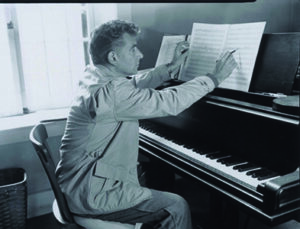노먼레브레히트 칼럼|| SINCE 2012
영국의 평론가가 보내온 세계 음악계 동향
피아노 앞에 앉은 지휘자들 피아니스트에게 총을 겨누지 말고, 보호하라!

지휘자라는 직업을 과연 정규직이라 부를 수 있는지 궁금하다면, 왜 수많은 마에스트로가 다양한 부업을 하는지 생각해보면 된다.
부업의 예를 들자면 피아노 연주가 있다. 사이먼 래틀은 아내 막달레나 코제나의 성악 독창회에서 반주하며 이곳저곳을 종횡무진으로 해왔다.
이스라엘 필하모닉, 로테르담 필하모닉의 젊은 지휘자 라하브 샤니는 그렇게 보이지는 않지만 거의 할머니뻘인 마르타 아르헤리치와 피아노 한 대에서 함께 연주하는 포핸즈(four-hands) 피아노 공연을 하며, 코번트 가든의 음악감독인 안토니오 파파노는 테너 이안 보스트리지를 위해 정기적으로 가곡을 연주한다.
메트로폴리탄 오케스트라 및 필라델피아 오케스트라의 음악감독 야니크 네제 세갱은 음반사 도이치 그라모폰(DG)과 솔로 피아노 음반을 발매했으며, 바스티유 오페라극장, 서울시교향의 전 음악감독인 정명훈 역시 같은 음반사에서 두 장의 솔로 피아노 음반을 발매했다.
커리어를 바꾼 그들의 행보
다들 왜 이렇게까지 하는 것일까? 그렇게 시간이 남아돌 만큼 많은 걸까?
 이렇게 부업에 열심인 이들을 제외한다고 해도 전문 피아니스트 출신으로 중도에 커리어를 지휘로 전향하였으나 단상 위에서 양팔을 흔들 수 없을 때마다 여전히 건반을 향해 돌진하는 이들도 있다. 바로 생각나는 인물로는 다니엘 바렌보임, 크리스토프 에셴바흐, 미하일 플레트뇨프, 블라디미르 아시케나지가 있다. 바렌보임의 경우 강박에 가까운데, 그는 깨어있는 시간 중 절반은 음악을 만들지 않고는 못 배기는 사람이다. 이름을 언급하지는 않겠지만 다른 이들도 피아노를 지휘자로서 성공하지 못했을 때 돌아갈 보험처럼 여긴다. 어느 쪽이든 퇴보라고 볼 수 있으며, 섬세한 음악적 기반에도 악영향을 끼친다.
이렇게 부업에 열심인 이들을 제외한다고 해도 전문 피아니스트 출신으로 중도에 커리어를 지휘로 전향하였으나 단상 위에서 양팔을 흔들 수 없을 때마다 여전히 건반을 향해 돌진하는 이들도 있다. 바로 생각나는 인물로는 다니엘 바렌보임, 크리스토프 에셴바흐, 미하일 플레트뇨프, 블라디미르 아시케나지가 있다. 바렌보임의 경우 강박에 가까운데, 그는 깨어있는 시간 중 절반은 음악을 만들지 않고는 못 배기는 사람이다. 이름을 언급하지는 않겠지만 다른 이들도 피아노를 지휘자로서 성공하지 못했을 때 돌아갈 보험처럼 여긴다. 어느 쪽이든 퇴보라고 볼 수 있으며, 섬세한 음악적 기반에도 악영향을 끼친다.
대부분의 음악가는 자신의 일생을 어떻게 살아갈지 퍽 이른 시기에 결정한다. 구스타프 말러는 15세의 나이로 빈 음악원에서 학생 오케스트라를 마주하고는, 이제 더 웅장하고 만족스러운 소리를 낼 방법이 생겼으니 대중 앞에서 다시는 피아노 건반을 두드리지 않으리라 다짐했다. 그는 연주회에서 자신의 곡을 위해서만 피아노 앞으로 돌아갔으며, ‘교육적인’ 목적으로 뉴욕 필하모닉과 함께 하프시코드를 연주하며 바흐 모음곡을 지휘한 적도 한 번 있다.
많은 전문지휘자가 전례에 따라 피아노를 등졌다. 헤르베르트 폰 카라얀, 예브게니 므라빈스키, 라파엘 쿠벨리크, 클라우디오 아바도는 모두 자신의 재능을 꼭꼭 숨겨둔 훌륭한 피아니스트들이었다. 조지 거슈윈의 ‘랩소디 인 블루’ 피아노 연주와 모차르트, 라벨, 쇼스타코비치의 피아노 협주곡 디렉팅을 고집했던 뉴욕 필하모닉의 음악감독 레너드 번스타인(1918~1990)만이 예외라고 볼 수 있다.
두 역할을 오가는 이들 속 고통 받는 대상
번스타인의 숙련도에 대해서는 독자적으로 생각해 볼 수도 있지만, 유튜브에서 무료 청취가 가능한 공연에서도 확인할 수 있다. 그의 뻔뻔스러움은(철면피라는 표현은 그다지 객관적이지 않으므로) 일부 청자들이 떠나는 계기가 되었으며, 특히 ‘뉴욕타임스’의 수석 비평가 해럴드 숀버그의 분노를 샀다. 피아노에 대해서라면 저명한 역사가였던 숀버그는 번스타인의 연주와 그가 청중에게 보내는 몰염치한 추파를 비난할 기회라면 놓치는 법이 없었다. 숀버그는 이렇게 묻는다. “매력과 대중성을 얼마나 쌓아야 진지한 음악성으로 살아남을 수 있을까요?”
숀버그의 말이 딱 맞았다. 번스타인은 피아니스트와 지휘자라는 두 가지 역할을 수행함으로써 전능함에 가까운 허영심을 충족했으며 자신이 연주하는 곡을 희생시켰다. 얼마 지나지 않아 앙드레 프레빈과 가여운 숀버그는 절망으로 인해 거의 죽을 뻔했다. “요즘은 피아니스트인 지휘자들이 건반 앞에서 최소한 한 번 정도는 지휘하는 게 관습상 필요해 보이죠. 누군가를 심하게 상처 주는 일 하나 없이, 물론 가끔 작곡가가 상처받기도 하지만, 그저 소소한 자아도취 행위입니다.”
참으로 맞는 말이지만, 작곡가들만 고통받는 것은 아니다.
클래식 음악계에는 연주회에서 성악가와 바이올리니스트의 반주를 하는 사람들을 위한 틈새시장이 있다. 이른바 ‘앙상블 피아니스트’라고 불리는 이들은 대체로 자신을 내세우지 않고 위대함이라는 그림자 속에 살기를 선택한 영웅들이다. 이들 중 소수만이(특정인의 전속) 반주를 통해 인기를 얻었는데, 제럴드 무어(1899~1987)와 디트리히 피셔 디스카우, 레프 오보린(1907~1974)과 다비트 오이스트라흐, 램버트 오키스(1946~)와 안네 조피 무터, 헬무트 도이치(1945~)와 요나스 카우프만이 그에 해당한다. 이들은 무대 위에서 헌신하는 없어서는 안 될 파트너이자 한가한 지휘자들이 쳐들어간 멸종위기 구역의 보호대상종이다.
음악의 올바른 반쪽을 완성하기 위해
지휘자 한 명을 피아노 앞에 앉히면 실내악 공연 특유의 친밀감이 떨어진다. 독주자는 지휘자를 따르도록 훈련받았고, 지휘자는 이끄는 것에 익숙하다. 훌륭한 실내악 연주의 본질인 연주자들 간의 동등성은 악보를 넘어 사라지고 만다. 건반 앞에 앉아 아내를 위해 반주를 하는 래틀의 연주에서 나는 지나치게 강조된 피아노와 함께 단조로움이 느껴졌다.
세갱의 연주는 한층 더 부족하다. 바이올리니스트 리사 바티아슈빌리의 새 음반(DG) 속 드뷔시 곡은 마치 바이올리니스트는 이쪽에, 지휘자는 저쪽에 떨어져 분리된 것처럼 들린다. 서서히 흩뿌려지며 폭포수처럼 쏟아져 내리는 드뷔시만의 음색은 찾을 수 없었다. 열성적인 피아니스트 비킹구르 올라프손의 최신 드뷔시 음반(DG)을 들어보면 그 생생한 차이를 느낄 수 있을 것이다.
실내악을 지휘자들에게 개방한 것은 어떤 부정적인 결과를 가져왔을까? 우리가 추측하는 것 그 이상이다. 최근까지도 ‘반주자’라고 불렸던 앙상블 피아니스트들은 본인의 업에 대한 일말의 자긍심을 갖기 위해 고군분투해왔다. 한 명의 지휘자가 이들을 피아노 스툴 밖으로 밀어내고 소나타나 연가곡을 연주할 기회를 얻어내면, 앙상블 피아니스트의 부재를 눈치챈 이들은 거의 없겠지만 이 중요한 직업인들의 사기는 저하되고 결국 쇠락하고 만다.
아직 실내악 피아니스트를 보호하기 위해 온 사회가 나서야 할 지경까지는 아니지만, 이제는 독주자들이 그들의 또 다른 반쪽을 위해 지지를 표명해야 할 시점이다. 대단히 명예롭게도 요나스 카우프만은 항상 자신의 실내악 파트너이자 전 대학 스승인 헬무트 도이치와의 동등한 지급을 요청한다. 카우프만은 이렇게 언급한다. “음악적인 자연스러움은 음악을 만드는 데에 있어 동일한 즐거움을 공유하는 동등한 파트너가 있을 때만 비로소 가능합니다. 당연한 말이지만요.” 지휘자들이여, 그의 말을 새겨두라.
번역 evener
——————————————————–
노먼 레브레히트 칼럼의 영어 원문을 함께 제공합니다
본 원고는 본지의 편집 방향과 일치하지 않을 수 있습니다

If ever you wonder if conducting is a proper job, ask yourself why so many maestros do other things on the side. Playing the piano, for instance. Simon Rattle has been popping up here and there, accompanying his wife Magdalena Kozena in song recitals. Lahav Shani, young baton of the Israel Philharmonic and Rotterdam Phil, plays four-handconcerts with MarthaArgerich, who is old enough to be his Grandma (but doesn’t look it). Antonio Pappano, the Covent Garden chief, regularly fingers out Lieder for tenor Ian Bostridge. Yannick Nézet-Séguin, music director of the Metropolitan Opera and the Philadelphia Orchestra, has recorded a solo piano album for Deutsche Grammophon. Myung Whun Chung, ex-head of the Opéra Bastille and the Seoul Philharmonic, has released two solo piano albums on DG. Why do they do it? Must be too much time on their hands. These sideliners aside, we also have a breed offormer concert pianists who transitioned into conducting midway through their career but still make a dash for the keys whenever they are not waving their arms. The likes of Daniel Barenboim, Christoph Eschenbach, Mikhail Pletnev and Vladimir Ashkenazy spring to mind.For Barenboim, it’s an obsession: he cannot go half a waking hour without making music. For others (we won’t name them), it’s an insurance policy to be called in if the conducting job fails. Either way, it’s a backward step and it has a damaging impact on a delicate part of the musical infrastructure. Most musician decide quite early how they want to spend their lives. Gustav Mahler,facing a student orchestra at the age of 15 in the Vienna Conservatoire, resolved that he never wanted to touch apiano againin public now he had the means to create a bigger, more satisfying noise. He returned to the piano onlyto accompany his own songs in recital. Once, for ‘educational ‘ purposes, heconducteda Bach suite while playing the harpsichordwith the New York Philharmonic. Most professional conductorsfollowed suit and put the piano behind them. Herbert von Karajan, Evgeny Mravinsky, Rafael Kubelik and Claudio Abbado were allfine pianists who kept their skills pretty much to themselves. An exception was Leonard Bernstein who, as music director in New York,persisted in directing Gershwin’s Rhapsody in Bluefrom the keyboard, as well as piano concertos by Mozart, Ravel and Shostakovich. You can form your own opinion of his proficiency, or otherwise, from performances that are freely available on Youtube, but his effrontery – chutzpah was not yet a clinical noun – alienated some listeners and particularly outraged Harold Schonberg, chief critic of the New York Times.Schonberg, a brilliant historian of the piano, missed no opportunity to disparage the quality of Bernstein’s playing and the shamelessness of his audience flirtation. ‘How much glamour and popular buildup can serious musicianship survive?’ he demanded. Schonberg was dead right. Bernstein, by playing both roles of pianist and conductor, indulged a vanity that verged on omnipotence, and he did so at the expense of the music he played.Soon after,along came Andre Previn and poor Schonberg nearly died of despair:‘It seems de rigueur these days for conductors who are pianists to make at least one appearance conducting from the keyboard. It is a little ego trip that does not hurt anybody very badly except, once in a while, the composer.’ So true – butit was not only the composers who suffered. There is aniche in classical music for people who accompany singers and violinists in recital. They are known as ‘collaborative pianists’ and are, on the whole, self-effacing heroes who choose to live in the shadow of greatness. A few acquire fame by association-Gerald Moore with Dietrich Fischer-Dieskau, Lev Oborin with David Oistrakh, Lambert Orkis with Anne-Sophie Mutter, Helmut Deutsch with Jonas Kaufmann. They are indispensable partners who contribute much of themselves to the process, but they are also an endangered species, never more so than when idle conductors invade their protected space. Put a conductor at the piano and the particular intimacy of a chamber recital is jeopardised. Soloists are trained to defer to conductors and conductors areaccustomed to being followed. The parity between performers that is the essence of good chamber music is lost between bars. Listening to Rattle accompany his wife at the piano I hear an over-emphasis on his part and a lack of colour. Yannick’s performance is even more deficient. A new Debussy track on DG with the violinist Lisa Batiashvili sounds compartmentalized, the violinist in one domain, the conductor in another. The trickling, tumbling cascade of a Debussy waterfall is nowhere to be heard. Listen to the dedicated pianist VíkingurÓlafsson in his current Debussy release and you’ll hear the vivid difference. What harm is done by letting conductorsinto our chamber music? More than you’d suspect. Collaborative pianists – we only recently stopped calling them ‘accompanists’ – have struggled to acquire a modicum of dignity for their vocation. When a conductor pushes them off the stool and blags his way through a sonata or song cycle, few in the audience know that they are missing butan essential occupation is diminished and demoralized. It hasn’t yet reached the point where we need a society for the protection of chamber pianists, but it is about time that soloists stood up more for their other halves. To hisgreat credit, Jonas Kaufmann always insists on equal billing for Helmut Deutsch, who is not only his recital partner but also his former college professor. Kaufmann says: ‘Musical spontaneity only unfolds when you have equal partners that share the same joy of making music. That’s how it should be.’ Conductors, take note.
글 노먼 레브레히트
영국의 음악·문화 평론가이자 소설가. ‘텔레그래프’지, ‘스탠더즈’지 등 여러 매체에 기고해왔으며, 지금 이 순간에도 자신의 블로그(www.slippedisc.com)를 통해 음악계 뉴스를 발 빠르게 전한다
—————–
라하브 샤니와 아르헤리치
레너드 번스타인
요나스 카우프만과 헬무트 도이치
사이먼 래틀







